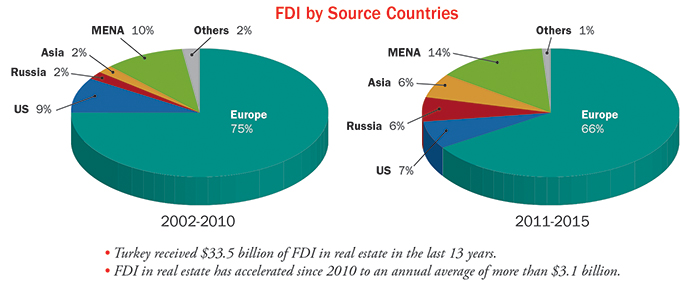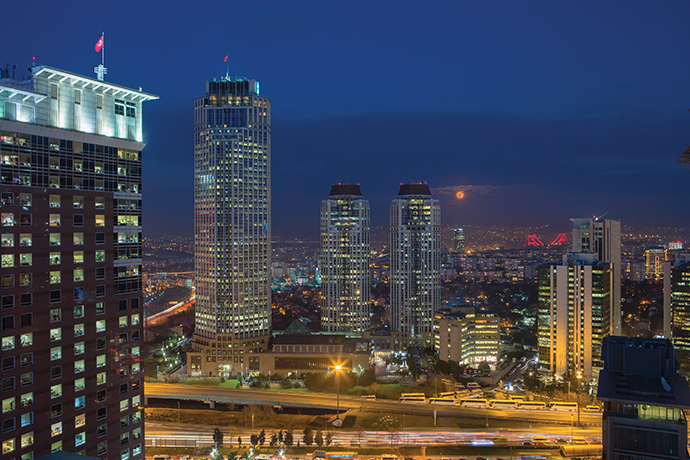Looking for an analogy with which to characterize Turkey’s emergence as a regional economic power and world-class capital investment destination? Consider its national air carrier, Turkish Airlines. Not that long ago, Turkish was a mainly regional airline with a handful of global destinations, a mediocre balance sheet and little else to distinguish it from other carriers serving Istanbul, Ankara and other Turkish cities. Today, Turkish is a world-class, global airline serving more than 280 destinations worldwide, a fleet of more than 300 state-of-the-art aircraft and a growth trajectory that rivals that of the ME3 carriers (Emirates, Qatar Airways and Etihad), which have become global powerhouses despite the small populations of their home markets.
Ditto for Turkey as an engine of economic growth and prosperity. Recent multinational investors point to Turkey’s “economic dynamism” as the energy that caught their attention — and kept it as they established key innovation and production centers in the country.
“Turkey’s fast-growing, dynamic economy, strong pharmaceutical industry, well developed infrastructure and highly qualified human resources make GlaxoSmithKline (GSK) a firm believer in this country’s future,” says Serkan Yagcioglu, GSK’s Head of CIS. “There have been significant improvements in the business and investment environment in recent years. Our belief in Turkey resulted in the decision to bring the headquarters of GSK’s Middle East North Africa and Commonwealth of Independent Countries (CIS) region to Istanbul in which I am heading a CIS cluster as a Turkish. We are running about 30 countries from Turkey now. It is an important step towards making Turkey a regional base for GSK, and we have long-term investment plans here.”

Consider Turkey’s economic underpinnings in mid-2016:
- Economic growth of 3.1 percent in 2015, estimated growth of 3.4 percent in 2016 and projected growth of 3.6 percent in 2017 — the economic outlook is more robust than many of the largest developing economies;
- The fourth-fastest growing economy of the G20 nations;
- Structural reforms in place to mitigate shocks to the global financial system;
- The lowest current account deficit level since 2009 and a markedly declining foreign account deficit;
- Soaring foreign direct investment levels (see charts), to US$165 billion at year-end 2015; and
- Healthy real estate markets — housing, office space and retail.
A Plentiful Supply of Workers
Accessing the right workers is just as important to global capital investors as an economically sound marketplace.
“BASF has operated in these lands for 136 years and employs around 800 people in Turkey,” says Buğra Kavuncu, CEO of BASF Türk. “This demonstrates how much we value Turkey. I believe that Turkey has great potential, and our operations in Turkey will contribute a lot both to the country and BASF.”
Turkey’s workforce is highly competitive and far younger than the average for Europe — half the country’s population is under age 30. And companies will be hard pressed to find a larger supply of researchers elsewhere in the region — the Organization for Economic Co-operation and Development estimates a supply of nearly 175,000, and more than 80,000 students were enrolled in doctoral studies in Turkey in 2013, which is more than Poland, Romania and Slovakia combined. This means multinationals, like Bosch, can plan for the long term in Turkey, confident that it will continue to have access to the skill sets it requires to expand across product lines and operating divisions, which is the predictability that global investors look for in a business climate.
“Bosch is a leading supplier of products and services with an annual turnover of €3.1 billion, more than 15,000 associates and total investment of €2.2 billion operating in Turkey since 1910,” says Steven Young, President of Bosch Turkey and Middle East. “High quality production performance, attainable through competent suppliers, qualified workforce, a growing regional market and continuously improving infrastructure makes Turkey one of the most attractive countries in terms of investment. Our aim is to increase Bosch’s existing 1-percent-plus share of Turkey’s total export to even higher figures in the coming years. We will continue supplying our products and services under our logo ‘Invented for life’ to the automotive, manufacturing, renewable energies, construction and infrastructure business areas whilst maximizing our contribution to the nation’s 2023 targets for the centennial of the Turkish Republic.”
This Investment Profile was prepared under the auspices of the Republic of Turkey Prime Ministry Investment Support and Promotion Agency (ISPAT). For more information, visit invest.gov.tr.

